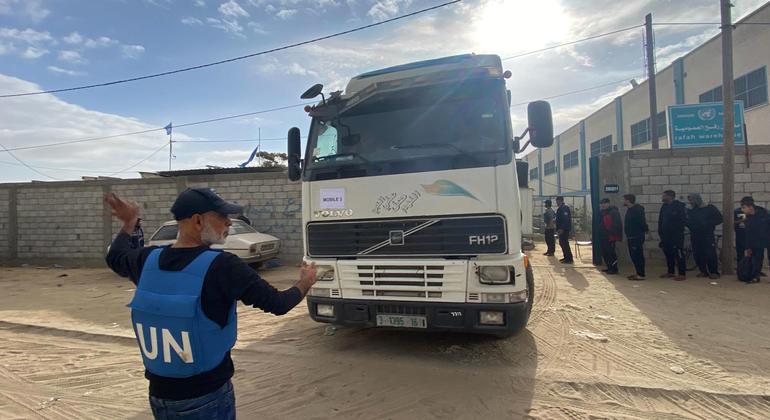He said the UN was able to step up delivery of basic supplies into and across the Gaza Strip during the week-long pause in fighting, primarily through the Egyptian and Palestinian Red Crescent Societies.
This included 630 metric tonnes of flour for 224,000 people in the south, and 63,000 blankets and mattresses.
“Cooking gas had been entering daily from Egypt during this period and has been available, or at least had been available, at one distribution centre in the south, in not enough quantities unfortunately to meet the demand,” he added.
Trucks also transported 4,850 metric tonnes of food, 1,110 metric tonnes of bottled water, 148 metric tonnes of medical supplies, and 29,500 litres of fuel. These items were delivered to shelters run by the UN agency that assists Palestine refugees, UNRWA, as well as hospitals and warehouses in northern Gaza.
Mr. Dujarric cautioned that any continuation in the uptick in the delivery of basic supplies is now uncertain because of the resumed hostilities.
“We must have at least the same volume of fuel and other humanitarian goods enter Gaza that was entering during the pause,” he said.
Music star The Weeknd donates 4 million meals for WFP response in Gaza
Multi-platinum recording artist The Weeknd, who is a Goodwill Ambassador for the UN World Food Programme (WFP), has directed $2.5 million from his XO Humanitarian Fund to the agency’s response in Gaza.
The donation, which equates to four million emergency meals, will fund enough food to potentially feed more than 173,000 Palestinians for two weeks.
WFP said it comes at a critical time when more than one million people are on the verge of starvation in Gaza, where fighting between Israel and the militant group Hamas resumed on Friday.
The Weeknd, whose real name is Abel Tesfaye, has been a WFP Goodwill Ambassador since October 2021.
He has committed to dedicating the equivalent of $1 per ticket sold during the global leg of his After Hours Til Dawn stadium tour next year to the XO Humanitarian Fund, which has raised $5 million to date.
Afghanistan: $26 million appeal for returnees from Pakistan
Meanwhile, WFP is seeking $26.3 million to assist one million Afghans forced to leave Pakistan following the Government’s decision to deport undocumented foreigners.
The policy came into effect last month and more than 370,000 people have since made their way back to Afghanistan, where a harsh winter awaits them.
WFP are on the ground at two border crossings supplying families with cash to cover their most basic food needs.
Returnees face a bleak future in Afghanistan, where one-third of the people do not know where their next meal will come from and some areas in the west are also still reeling from multiple earthquakes.
Communities across the country rely on WFP food assistance to survive, but funding shortfalls have forced the agency to cut emergency assistance this year.
UN rights chief calls for action to end slavery
More than 50 million people today are victims of slavery, one in four of them children, the UN High Commissioner for Human Rights has said.
Volker Türk urged political and business leaders “to take real action to uphold human rights” in his message on the International Day for the Abolition of Slavery, observed on 2 December.
He said slavery is able to thrive because of how many economies are structured and run, adding that it preys on people whose rights are denied.
“We know how to end slavery,” he said. “We know that without action, millions more people will need help.”

A disabled student on a sports court in Brazil.
Persons with disabilities face discrimination despite SDG promise: Guterres
Persons with disabilities must be at the decision-making table and across countries’ efforts to achieve the Sustainable Development Goals (SDGs) – from poverty eradication, to health, education, and climate action.
That’s the message from UN Secretary-General António Guterres to mark the International Day of Persons with Disabilities, observed on 3 December.
The 17 SDGs were adopted by world leaders in 2015 and have a 2030 deadline.
Mr. Guterres said achieving the goals requires living up to the promise to leave no one behind, especially the 1.3 billion persons with disabilities worldwide.
However, they continue to face systemic discrimination and barriers that restrict their meaningful inclusion in all areas of society.
“Truly sustainable development for persons with disabilities requires a laser-like focus on their needs and rights – not only as beneficiaries, but as active contributors across social, economic and political life,” he said.
The UN chief urged everyone “to work side-by-side with persons with disabilities to design and deliver solutions based on equal rights in every country and community.”



